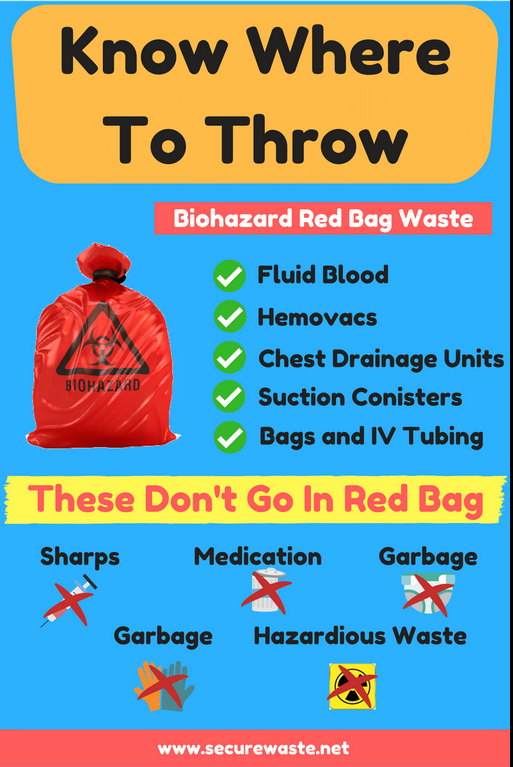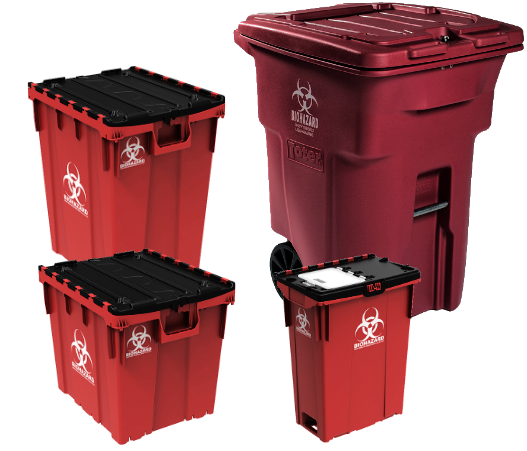Beyond Clean-up: Ensuring Security with Specialist Medical Waste Removal
Beyond Clean-up: Ensuring Security with Specialist Medical Waste Removal
Blog Article
Stay Ahead of Laws: Professional Suggestions on Medical Garbage Disposal
In a world where the healthcare market is regularly progressing, it is essential for medical facilities to stay ahead of policies when it pertains to the appropriate disposal of clinical waste. With rigid standards and regular regulative modifications, it can be testing to browse the complexities of this process. With skilled advice, centers can ensure conformity and reduce risks connected with inappropriate waste disposal. From comprehending the various categories of medical waste to implementing the appropriate collection and segregation approaches, this discussion will give beneficial understandings and workable tips to help centers remain ahead of guidelines in the ever-changing landscape of clinical garbage disposal.
Recognizing Clinical Waste Categories
Comprehending medical waste groups is necessary for correct disposal and management in health care centers. Clinical waste refers to any type of waste created by healthcare activities that may present a hazard to public health or the setting. It is essential to classify medical waste accurately to guarantee its secure handling, disposal, therapy, and transportation.
There are several groups of medical waste that medical care facilities require to be accustomed to. One of the most common categories include transmittable waste, pathological waste, sharps waste, pharmaceutical waste, and chemical waste. Each classification has certain guidelines and policies for its appropriate management and disposal.
Pathological waste refers to human tissues, organs, or body components that call for special handling and disposal. Pharmaceutical waste comprises ended, unused, or infected medications that require careful handling and disposal.
Staying Up-To-Date With Regulatory Modifications
Remaining current with regulative modifications is essential for health care centers to make sure conformity and correct management of medical waste disposal. medical waste removal service. With laws continuously advancing, it is crucial for healthcare centers to stay updated to stay clear of penalties, penalties, and possible damage to the atmosphere and public wellness
To remain ahead of governing adjustments, health care facilities need to develop a system for monitoring and monitoring updates. This can be done by registering for regulative newsletters, participating in conferences and workshops, and proactively participating in market organizations. In addition, centers need to mark a team member or team accountable for staying informed and distributing information to relevant stakeholders.
Regular interaction with governing agencies is additionally crucial. Healthcare facilities ought to establish partnerships with neighborhood, state, and federal firms to ensure they recognize any kind of modifications in policies that may influence their waste administration methods. This can be done via regular meetings, engagement in public comment durations, and proactive interaction with regulatory firms.
In addition, health care centers ought to think about partnering with waste monitoring firms that focus on medical garbage disposal (medical waste disposal services with WasteX). These companies are commonly well-versed in the most recent laws and can provide support and assistance to guarantee compliance
Applying Proper Collection and Segregation Methods
To efficiently handle medical waste disposal, health care facilities should establish proper collection and segregation approaches in conformity with governing standards. Applying these techniques ensures the safe handling and disposal of possibly hazardous products, protects the environment, and reduces the threat of injuries and infections to healthcare workers and the general public.
Proper collection and segregation approaches include making use of designated containers and labeling systems. Medical care centers must offer clearly classified containers for various types of medical waste, such as sharps, transmittable waste, pharmaceutical waste, and non-hazardous waste. These containers must be color-coded and clearly significant to prevent confusion and advertise simple identification.
In addition, medical care facilities need to educate their staff on the correct treatments for collecting and setting apart medical waste. This includes informing them on the different kinds of waste, the suitable containers to use, and the relevance of complying with regulations and standards. Regular training sessions and refresher course programs need to be carried out to ensure that team member stay up-to-date on finest techniques.
Moreover, healthcare centers ought to develop a system for regular collection and disposal of medical waste. This might involve partnering with accredited waste management business that concentrate on medical garbage disposal. These firms will make sure that the collected waste is delivered and gotten rid Continued of in conformity with regulatory demands.
Picking the Right Disposal Techniques

Health care centers should very carefully take into consideration the suitable disposal techniques for clinical waste to make certain compliance with policies and lessen ecological influence. Choosing the best disposal techniques is vital in keeping a safe and sustainable health care atmosphere. There are numerous alternatives readily available for the disposal of medical waste, each with its own advantages and limitations.
Incineration is one of the most common and effective methods for throwing away particular kinds of clinical waste, such as pathological waste and sharps. It includes the regulated combustion of waste at heats, decreasing it to ash. Incineration can launch dangerous contaminants into try this out the air and contribute to air pollution.

It entails subjecting waste to high-pressure heavy steam, effectively eliminating any type of microorganisms existing. Autoclaving is suitable for dealing with a broad array of medical waste, including sharps, plastics, and lab waste.
Chemical therapy entails the usage of chemicals to decontaminate and neutralize the waste. Microwave treatment uses microwave power to warmth and decontaminate the waste.
Ensuring Compliance Through Documentation and Training
After thoroughly thinking about the suitable disposal techniques for medical waste, healthcare centers have to make certain conformity with laws and lessen ecological effect by executing effective documentation and training treatments. This action is important in preserving a lasting and risk-free atmosphere for both healthcare employees and the basic public.

Medical care facilities must develop an extensive system to videotape and track all elements of clinical waste disposal, consisting of types of waste created, quantities, and disposal techniques made use of (medical waste removal near me). By maintaining precise documents, healthcare facilities can show their dedication to compliance and supply proof of their waste management practices if needed throughout inspections or audits.
Health care employees who manage clinical waste must get proper training on waste segregation, managing, and disposal procedures. By offering extensive training, healthcare facilities can encourage their team to make enlightened choices and lessen the danger of improper waste disposal.
Conclusion
To conclude, remaining in advance of policies in medical garbage disposal is critical for medical care centers. medical waste removal services. Comprehending the different groups of clinical waste, staying upgraded with regulative changes, implementing correct collection and segregation approaches, picking the ideal disposal methods, and making certain compliance via paperwork and training are all important actions. By complying with these guidelines, healthcare companies can effectively handle and dispose of clinical waste in a responsible and risk-free way
From understanding the various categories of clinical waste to implementing the appropriate collection and partition methods, this conversation will supply workable suggestions and beneficial insights to aid facilities remain ahead of guidelines in the ever-changing landscape of medical waste disposal. - medical waste disposal services with WasteX
The most usual categories include contagious waste, pathological waste, sharps waste, pharmaceutical waste, and chemical waste. Health care centers must give plainly classified containers for various kinds of clinical waste, such as sharps, transmittable waste, pharmaceutical waste, and non-hazardous waste. Medical care centers need to develop a thorough system to Continued record and track all aspects of clinical waste disposal, consisting of kinds of waste created, amounts, and disposal techniques utilized. Health care workers who deal with medical waste should receive appropriate training on waste partition, taking care of, and disposal treatments. Report this page